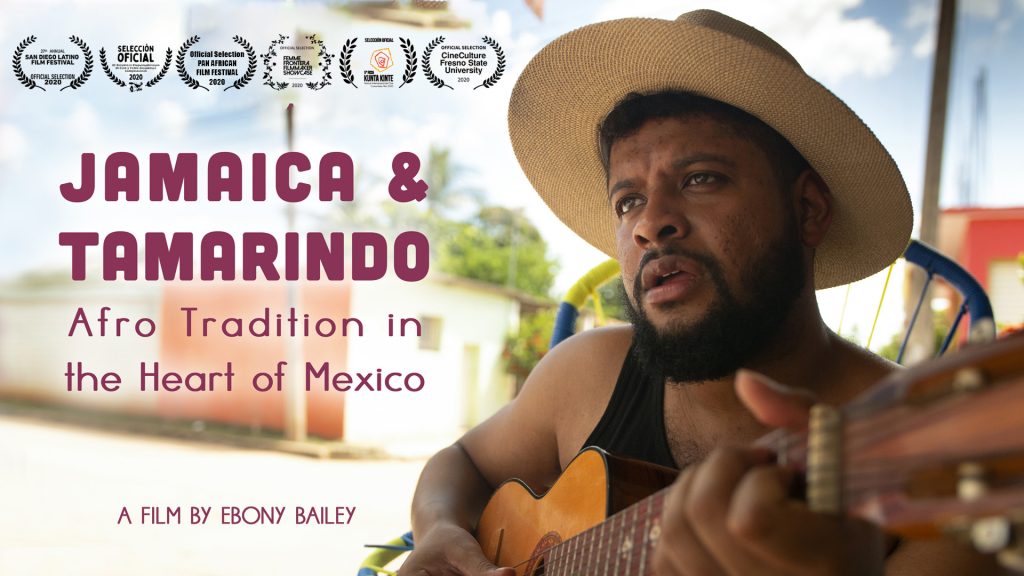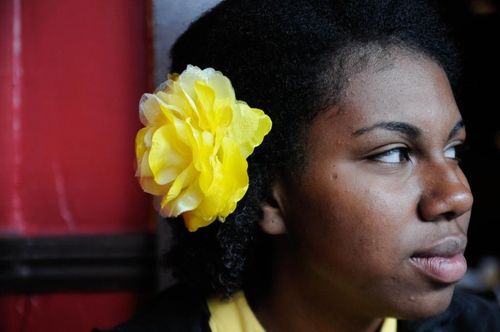3. Videos, podcasts, ¡y más!
VI. Las comunidades afrolatinas
A. Documental: Jamaica y Tamarindo: Tradición afro en el corazón de México.
Con más de dos millones y medio de habitantes, los afrodescendientes constituyen el 2,04 % de la población total de México (INEGI). Sin embargo, la larga historia de los afromexicanos ha sido tradicionalmente silenciada y hasta el 2019, la población afromexicana no fue reconocida oficialmente en la constitución de México. Debido a que la esclavitud fue abolida en 1829, un gran número de esclavizados de los estados del sur de los Estados Unidos escaparon hacía México quedándose a vivir en ciudades quedándose junto a poblaciones afrodescendientes ya existentes.
En su documental Jamaica y Tamarindo: Tradición afro en el corazón de México (2019), la directora afrochicana, Ebony Marie Bailey explora la experiencia afromexicana en sus dimensiones de raza, género y clase. Al mismo tiempo, Bailey recupera el legado cultural afro y su presencia constante en la formación de la cultura mexicana.
Actividad A.1. Vocabulario.
Review this timeline about the Afromexican community in Mexico.

Para ver el documental Jamaica y Tamarindo: Tradición afro en el corazón de México haz click aquí.
NOTA: This documentary can be accessed through your university via Kanopy or local library. If you have trouble, please contact Larry Ratner at info@epfmedia.com to receive a link and code.
Comprensión y discusión.
Después de ver el documental de Ebony M. Bailey, contesta a las siguientes preguntas.
- ¿Cuáles son los estereotipos que se asignan al negro en la sociedad mexicana?
- ¿Qué implicaciones tienen estos estereotipos para las personas afromexicanas?
- ¿Cómo se ha sentido la primera entrevistada en la Ciudad de México?
- ¿Cómo se identifican los entrevistados?
- Isaías afirma que “no podría decir que soy queer en mi pueblo” ¿cuál es el problema que ha tenido Isaías en la comunidad queer de la ciudad de México?
- ¿Cómo funciona la discriminación racial en la sociedad mexicana según las entrevistadas?
- ¿Cuál es el conocimiento que se ha perdido por causa del estigma?
- ¿Qué significa la palabra negra o negro para los entrevistados?
Sobre la directora:
Director’s Statement
I made this film as a way to reaffirm my own identity as a Black-Mexican-American, or as I like to say, a “Blaxican.” My mother is Mexican-American and my father is African-American. All of my life, my Mexican side was negated because of my Black features. “A Black girl cannot be Mexican,” they would tell me. These words have caused me to reflect on the role that Blackness plays in Mexican identity. What does it mean to be Mexican? Jamaica y Tamarindo: Afro Tradition in the Heart of Mexico illustrates the existence of African heritage in everyday aspects of Mexican culture. The jamaica hibiscus flower and tamarind are two popular ingredients in Mexico, but many in the country are not aware that these two plants have origins in Africa. Jamaica and tamarind become metaphors for the invisibilization of Mexico’s African heritage. In the film we meet Afro-Mexicans from different walks of life who speak about their own identities and experiences. For me, someone who grew up drinking agua de jamaica and eating spicy tamarindo candies, this film has allowed me to share a bit of my experience through the testimonies of other Afro-Mexicans. We aim for this film to serve as a platform for discussion in the global conversation of diversity and inclusion.
Director´s Biography
Ebony Bailey is a “Blaxican” filmmaker and photographer from Central California whose work explores cultural intersections and diaspora. Her documentaries have screened at film festivals and forums in the US, Mexico and Europe. Her photographs have appeared in NPR, LA Times and Remezcla. She has been awarded the Samuel L. Coleman scholarship for emerging filmmakers at the Haitian International Film Festival and was selected for the Tomorrow’s Filmmakers Today program by HBO and Hola Mexico Film Festival. She is currently completing her Master’s degree in documentary film at the National Autonomous University of Mexico. Ebony tells stories through film as a way to represent her communities and to build spaces of empowerment between diverse populations.

staying
knowledge
has lost
interviewed
